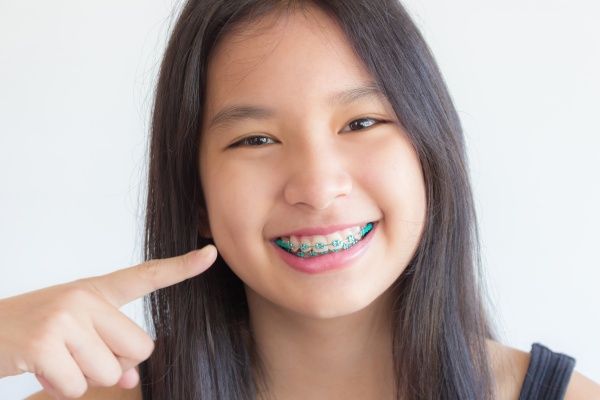What to Expect When Traditional Braces Are Placed on Your Teeth

Getting braces is a very common experience for children, teenagers and adults. Learning how to deal with braces can take you some time. If you know what to expect after having braces placed on your teeth, you can prepare for the treatment. Being properly informed can ease your nerves and confusion once you finally have this orthodontic treatment.
What to expect with braces
With traditional braces, patients can expect a metal bracket to attach to each tooth. A metal arch wire will attach to these brackets. Some people have brackets that clamp onto the arch wire while others have rubber bands connecting the brackets and wires. If a patient has an overbite or underbite, they might also need rubber bands connecting the bottom and top rows of the teeth. These work together to gradually realign the person’s bite to make it more effective.
Are braces uncomfortable?
At first, patients may experience some mild discomfort as the braces put a gentle, even pressure on the teeth. This pressure can cause a dull ache. Orthodontists recommend that patients stick to soft foods at first and make use of over-the-counter painkillers.
The braces can also rub sore spots on the inner part of the mouth. With little time, the skin will toughen, and the sores will fade. Until then, dentists recommend applying orthodontic wax to the rough brackets, so they no longer poke patients. After a week or two, discomfort should fade and it should not be too unpleasant.
Do braces affect eating?
Orthodontists may recommend that a patient sticks to soft, easy-to-chew foods in the first week of having braces. These can include smoothies, soups, mashed potatoes and oatmeal. Once the discomfort passes, normal dietary routines can resume.
However, the new dental equipment may require some changes. It can be more difficult to bite down on hard or crunchy foods. It is recommended to cut food into smaller pieces. Patients should also avoid food that is sticky or gooey, such as gum and caramel.
How do braces affect teeth cleaning?
Some patients find it difficult to clean the teeth with the braces in the way. However, it is extremely important. Not practicing good oral hygiene habits can lead to a buildup of plaque that hardens around the brackets. This can lead to a stained smile once the braces are removed as well as cause cavities. To avoid these problems, patients should brush after each meal to remove stuck food. Braces can shorten the life span of toothbrushes, so it is important to watch for frayed bristles.
How long are braces necessary?
Results will be dependent on several factors. These can include bone density, how misaligned the teeth are and the patient’s age. Changes are typically visible to the patient within six weeks. Within a few months, others may notice the change in a patient’s smile. The teeth will straighten slightly with each adjustment. It may take a few years for the braces to do their entire job. Orthodontists recommend meeting every four to six weeks and can give patients estimates on how long the treatment needs to continue.
Preparing for braces
When you have braces, it is normal to expect some slight inconvenience and discomfort. However, you should adjust pretty quickly to your braces. The advantages usually outweigh the minor annoyance and you will be left with a straighter, healthier smile.
Are you considering getting braces in the Dalton area? Get more information at https://drcalldental.com.
Check out what others are saying about our services on Yelp: Read our Yelp reviews.
Related Posts
Dentures are one of the leading tooth replacement options. The process of getting them from consultation to final fitting may look a little different for everyone, depending on factors like the type of denture the patient chooses and any preparation needed. If you are considering dentures, this process overview will give you a general idea…
Dentures have come a long way, as we can now provide multiple options to address missing teeth — from one tooth to a full mouth restoration. With customized partial dentures, patients can restore the function and appearance of their smile. If you want to restore your smile’s functionality without sacrificing a natural, healthy appearance, take…
Extensive tooth loss can impact your oral health and quality of life. Fortunately, all-on-4 dental implants offer a reliable foundation for a renewed smile that supports your oral health and overall well-being. This innovative technique provides a stable, long-lasting solution for those who have lost most or all of their teeth and are looking for…
Considering dentures? Read on to learn more. For individuals dealing with tooth loss, dentures might offer a life-changing experience, both for their dental function and aesthetics. Millions of adults depend on dentures for their dental needs. According to a National Nutrition and Health Examination Survey, about 57% of Americans aged 65 to 74 and 51%…


